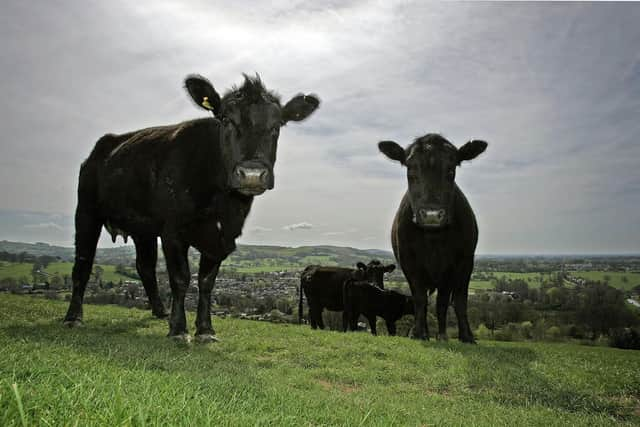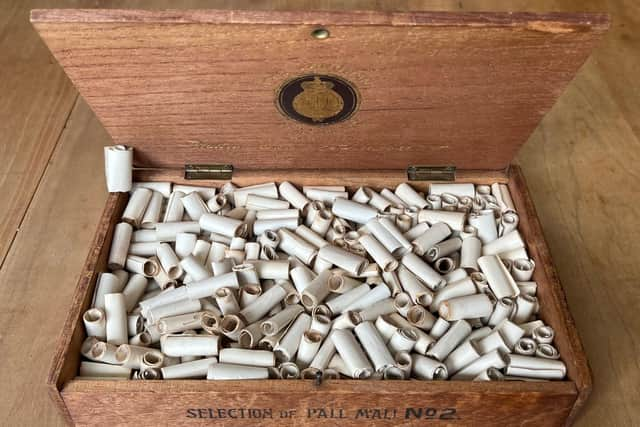Treating farm animals well is good for us, them and the whole planet – Philip Lymbery
It belonged to her great aunt, whose mother had made the box and written the little scrolls of paper herself, and she had, in turn, given it to my friend’s mother. At the beginning of each day, my friend would take one of the rolls and read the saying to herself. Each day, she would then try to fulfil that unspoken saying or promise.
The idea of a ‘promise box’ was developed by Christians to aid spiritual growth. Whilst the purpose was serious, for my friend it was enjoyable too. She recalled that every tiny roll smelt strongly of cigar tobacco, was stained and well-worn, but was nonetheless precious, and taught her so much. She has it still.
Advertisement
Hide AdAdvertisement
Hide AdOne day when she was a child, there was a minor scuffle at school and she was duly brought in front of the headteacher who demanded an explanation. Eager to end the debacle and get home, she thought of a quick excuse that verged on the impossible. The teacher stared at her.
It was then, that she remembered that day’s saying: “A single lie can destroy a thousand truths.” She was about to break a trust. Keeping that promise became more important to her than she had realised before. In the next few moments, she reverted to the truth. By keeping true to her daily saying from the promise box, she forged a friendship with her teacher that has continued for a lifetime.
These days, we hear a lot about promises based on creating a better world. There is much rhetoric around the many challenges that we face, including the very serious climate emergency and related collapse of nature.
Earth Hour
Many of us do what we can to help the planet. We make promises to ourselves to take the train more or turn out the lights. Perhaps some of us do nothing at all. Life after all can be challenging in many ways.


It scarcely seems that a day goes by without news about how we are on course to breach the 1.5C global temperature increase limit set by the Paris climate agreement. And nature – the source of our very livelihoods and one of our biggest allies against the climate crisis – is also under severe threat, facing alarming and unprecedented rates of loss globally.
But one thing is for sure, we are the first generation to have the solutions and know how to combat the crisis facing our planet, and the last generation who can act before it is too late. Last Saturday at 8.30pm, it was Earth Hour, a request for as many people as possible to spend 60 minutes doing something positive, anything at all, for the planet. Since 2007, Earth Hour has been known for the “lights off” moment – a symbolic event to show our collective support for the planet.
It’s less about doing something in those few minutes, but rather making our time on this planet count. To unite for our one home, this lonely planet, using Earth Hour as the spark to help create change.
Eating less, but better, meat


However, how many of us must have thought of ‘doing our bit’ by switching off the lights for an hour, only to find that the time had passed before we remembered to do it? But it’s important to remember that there are other important things we can do every day to help address the nature and climate crisis we face.
Advertisement
Hide AdAdvertisement
Hide AdOne promise we can make, is to seize the power of our plate, three times a day, through our food choices. It’s a promise we can all make: to go easy on the meat and dairy element within our diet. As consumers, we all have incredible power to change things, not just for the welfare of farmed animals but also for endangered wildlife and for our rivers, just through our food choices.
By choosing pasture-fed, free-range and organic meat, milk and eggs, we can support better food and better farm animal welfare which also helps our wildlife, biodiversity and soil health. It is effectively about eating less and better. About getting our consumption back in balance as a global society and getting our planet on track. About putting better food on our plates for our families and making a significant contribution to helping resolve the current nature and climate crisis.
What I have discovered over the years, is that factory farming is not only bad for the animals that are treated cruelly, but also bad for us and our environment. By keeping animals in tiny cages and feeding them grain, you get poorer quality meat and milk, and the eggs are less tasty too.
The win-win situation is to keep animals as they should be; in places where they can express their natural behaviours, on pasture, free-ranging. In these scenarios, it really does deliver better animal welfare, better food and a sustainable future. When I think back to my friend and her box of promises, it wasn’t lost on me that by keeping one of her daily promises, she gained a whole lifetime of value and happiness.
By making a promise to eat less but better meat and dairy, there is a big opportunity to gain value within our own lifetimes and create a better future for generations to come. Now that seems to me like a promise well worth making.
Philip Lymbery is chief executive of Compassion in World Farming, a former United Nations Food Systems Champion and award-winning author of Farmageddon: The True Cost of Cheap Meat; Dead Zone: Where the Wild Things Were; and his latest, Sixty Harvests Left: How to Reach a Nature-Friendly Future. He is on Twitter @philip_ciwf
Comments
Want to join the conversation? Please or to comment on this article.
